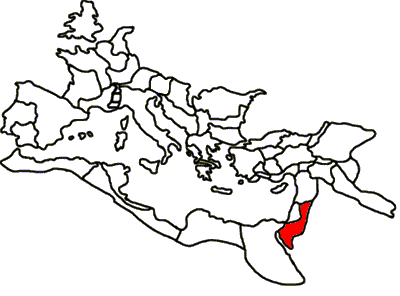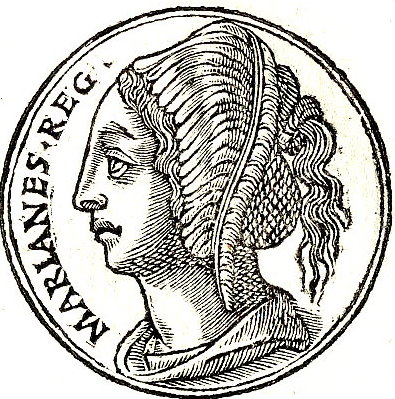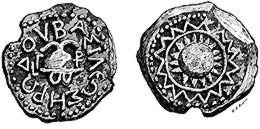|
Julia Iotapa (Cilician Princess)
Julia Iotapa or Julia Iotape, sometimes known as Julia of Cilicia (born ca. 80) was a Cilician princess who lived in the 1st century and 2nd century. Daughter of King Gaius Julius Alexander of Cetis, she married Gaius Julius Quadratus Bassus, Galatian Roman Senator from Anatolia. Biography Julia Iotapa was the daughter to King Gaius Julius Alexander and Queen Julia Iotapa of Cetis. Her eldest brothers were Gaius Julius Agrippa and Gaius Julius Alexander Berenicianus. She was born, raised and educated in Cetis. The Kingdom of Cetis was a small client state in the Roman Empire. Cetis was a small region in Cilicia that was previously ruled by her Cappadocian royal ancestors and Antiochus IV. The city in Cilicia Elaiussa Sebaste was a part of the Kingdom. When her parents married in Rome in 58, the Roman Emperor Nero crowned his parents as monarchs and gave them that region to rule. Surviving inscriptions on her family reveal that her family was related to important members of A ... [...More Info...] [...Related Items...] OR: [Wikipedia] [Google] [Baidu] |
Cilicia
Cilicia (); el, Κιλικία, ''Kilikía''; Middle Persian: ''klkyʾy'' (''Klikiyā''); Parthian: ''kylkyʾ'' (''Kilikiyā''); tr, Kilikya). is a geographical region in southern Anatolia in Turkey, extending inland from the northeastern coasts of the Mediterranean Sea. Cilicia has a population ranging over six million, concentrated mostly at the Cilicia plain. The region includes the provinces of Mersin, Adana, Osmaniye, along with parts of Hatay and Antalya. Geography Cilicia is extended along the Mediterranean coast east from Pamphylia to the Nur Mountains, which separates it from Syria. North and east of Cilicia lie the rugged Taurus Mountains that separate it from the high central plateau of Anatolia, which are pierced by a narrow gorge called in antiquity the Cilician Gates. Ancient Cilicia was naturally divided into Cilicia Trachea and Cilicia Pedias by the Limonlu River. Salamis, the city on the east coast of Cyprus, was included in its administrative jurisdiction. T ... [...More Info...] [...Related Items...] OR: [Wikipedia] [Google] [Baidu] |
Nabataeans
The Nabataeans or Nabateans (; Nabataean Aramaic: , , vocalized as ; Arabic language, Arabic: , , singular , ; compare grc, Ναβαταῖος, translit=Nabataîos; la, Nabataeus) were an ancient Arab people who inhabited northern Arabian Peninsula, Arabia and the southern Levant. Their settlements—most prominently the assumed capital city of Petra, Raqmu (present-day Petra, Jordan)—gave the name ''Nabatene'' ( grc, Ναβατηνή, translit=Nabatēnḗ) to the Arabian borderland that stretched from the Euphrates to the Red Sea. The Nabateans emerged as a distinct civilization and political entity between the 4th and 2nd centuries BCE,Taylor, Jane (2001). ''Petra and the Lost Kingdom of the Nabataeans''. London: I.B.Tauris. pp. 14, 17, 30, 31. . Retrieved 8 July 2016. with Nabataean Kingdom, their kingdom centered around a loosely controlled trading network that brought considerable wealth and influence across the ancient world. Described as fiercely independent by cont ... [...More Info...] [...Related Items...] OR: [Wikipedia] [Google] [Baidu] |
Jotapian
Jotapian (; la, Marcus F. Ru. Jotapianus; died ''c.'' 249) was a usurper in the eastern provinces of the Roman Empire during the reign of Emperor Philip the Arab, around 249. Jotapian is known from his rare coins and from accounts in Aurelius Victor (''Caesares'' xxix.2), Zosimus (i.20.2 and i.21.2), and Polemius Silvius (''Laterculus''). Life Origins Jotapian was a member of the Near East indigenous aristocracy. His name is similar to those of Queen Julia Iotapa and her daughter, princess Julia Jotapa of the Kingdom of Commagene, so he could have been a member of the Royal Family of Commagene, which had lost its power in favour of the Romans under Emperor Vespasian in 72. Aurelius Victor reports that Jotapian claimed descendance from an Alexander. According to some scholars, he referred to Alexander Severus, while other scholars note that King Antiochus I Theos of Commagene claimed descendance from Greek King Alexander the Great. He could be a possible descendant of Gaius ... [...More Info...] [...Related Items...] OR: [Wikipedia] [Google] [Baidu] |
Usurper
A usurper is an illegitimate or controversial claimant to power, often but not always in a monarchy. In other words, one who takes the power of a country, city, or established region for oneself, without any formal or legal right to claim it as one's own. Usurpers can rise to power in a region by often unexpected physical force, as well as through political influence and deceit. Etymology The word originally came from the Latin word ''usurpare'' (“to seize", "to take forcefully" or "to use”). Politics The Greeks had their own conception of what usurpers were, calling them tyrants. In the ancient Greek usage, a tyrant (''tyrannos''/''τύραννος'' in Greek) was an individual who rose to power via unconstitutional or illegitimate means, usually not being an heir to an existing throne. Such individuals were perceived negatively by political philosophers such as Socrates, Plato and Aristotle. Usurpers often try to legitimize their position by claiming to be a descendant ... [...More Info...] [...Related Items...] OR: [Wikipedia] [Google] [Baidu] |
Julia Iotapa (daughter Of Antiochus III)
Julia Iotapa, or simply Iotapa (before 17 – around 52), daughter of King Antiochus III of Commagene, was Queen of Commagene, consort of her King brother Antiochus IV. Biography Iotapa was the daughter of the late King Antiochus III of Commagene and Queen Iotapa of Commagene. Her parents were full-blooded siblings who had married each other. She was of Armenian, Greek and Median descent. Through her ancestor from Commagene, Queen Laodice VII Thea, who was the mother of King Antiochus I Theos of Commagene, she was a direct descendant of the monarchs from the Greek Syrian Kingdom, the Seleucid Empire. She was the sister of later King Antiochus IV of Commagene. Iotapa and her brother appeared to be very young, when their father died in 17. Roman Emperor Tiberius agreed with the citizens of Commagene to make their Kingdom a part of the Roman province of Syria. From 17 until 38, Iotapa seems that she had gained Roman citizenship. Iotapa would have put the Latin name Julia ... [...More Info...] [...Related Items...] OR: [Wikipedia] [Google] [Baidu] |
Antiochus IV Of Commagene
Gaius Julius Antiochus IV Epiphanes ( grc, Γάιος Ἰούλιος Ἀντίοχος ὀ Ἐπιφανής, before 17 AD – after 72 AD), the last king of Commagene, reigned between 38 and 72 as a client king to the Roman Empire. The epithet "Epiphanes" means "the Glorious". Life Antiochus was born a prince of the royal family of Commagene. His parents King Antiochus III of Commagene and Queen Iotapa were full-blooded siblings who had married each other. The younger Antiochus himself would marry his full-blooded sister Iotapa. Antiochus was of Armenian descent. Through his ancestor from Commagene, Queen Laodice VII Thea, who was the mother of King Antiochus I Theos of Commagene, he was a direct descendant of the Greek Seleucid kings. Antiochus appears to have been very young when his father died in 17. The Roman emperor Tiberius agreed with the citizens of Commagene to make their kingdom a part of the Roman province of Syria. Between 17 and 38, Antio ... [...More Info...] [...Related Items...] OR: [Wikipedia] [Google] [Baidu] |
Judaism
Judaism ( he, ''Yahăḏūṯ'') is an Abrahamic, monotheistic, and ethnic religion comprising the collective religious, cultural, and legal tradition and civilization of the Jewish people. It has its roots as an organized religion in the Middle East during the Bronze Age. Modern Judaism evolved from Yahwism, the religion of ancient Israel and Judah, by the late 6th century BCE, and is thus considered to be one of the oldest monotheistic religions. Judaism is considered by religious Jews to be the expression of the covenant that God established with the Israelites, their ancestors. It encompasses a wide body of texts, practices, theological positions, and forms of organization. The Torah, as it is commonly understood by Jews, is part of the larger text known as the ''Tanakh''. The ''Tanakh'' is also known to secular scholars of religion as the Hebrew Bible, and to Christians as the " Old Testament". The Torah's supplemental oral tradition is represented by later texts s ... [...More Info...] [...Related Items...] OR: [Wikipedia] [Google] [Baidu] |
Apostasy
Apostasy (; grc-gre, ἀποστασία , 'a defection or revolt') is the formal disaffiliation from, abandonment of, or renunciation of a religion by a person. It can also be defined within the broader context of embracing an opinion that is contrary to one's previous religious beliefs. One who undertakes apostasy is known as an apostate. Undertaking apostasy is called apostatizing (or apostasizing – also spelled apostacizing). The term ''apostasy'' is used by sociologists to mean the renunciation ''and'' criticism of, or opposition to, a person's former religion, in a technical sense, with no pejorative connotation. Occasionally, the term is also used metaphorically to refer to the renunciation of a non-religious belief or cause, such as a political party, social movement, or sports team. Apostasy is generally not a self-definition: few former believers call themselves apostates due to the term's negative connotation. Many religious groups and some states punish apostat ... [...More Info...] [...Related Items...] OR: [Wikipedia] [Google] [Baidu] |
Herodian Dynasty
The Herodian dynasty was a royal dynasty of Idumaean (Edomite) descent, ruling the Herodian Kingdom of Judea and later the Herodian Tetrarchy as a vassal state of the Roman Empire. The Herodian dynasty began with Herod the Great, who assumed the throne of Judea, with Roman support, bringing down the century-old Hasmonean Kingdom. His kingdom lasted until his death in 4 BCE, when it was divided among his sons as a tetrarchy, which lasted for about 10 years. Most of those tetrarchies, including Judea proper, were incorporated into Judaea Province from 6 CE, though limited Herodian ''de facto'' kingship continued until Agrippa I's death in 44 CE and nominal title of kingship continued until 92 CE, when the last Herodian monarch, Agrippa II, died and Rome assumed full power over his ''de jure'' domain. History Origin During the time of the Hasmonean ruler John Hyrcanus (134–104 BCE), Judea conquered Edom (Idumea) and forced the Edomites to convert to Judaism. The Edo ... [...More Info...] [...Related Items...] OR: [Wikipedia] [Google] [Baidu] |
Mariamne (second Wife Of Herod)
Mariamne I (died 29 BCE), also called Mariamne the Hasmonean, was a Hasmonean dynasty, Hasmonean princess and the second wife of Herod the Great. She was known for her great beauty, as was her brother Aristobulus III of Judea, Aristobulus III. Herod's fear of his rivals, the Hasmonean dynasty, Hasmoneans, led him to execute all of the prominent members of the family, including Mariamne. Her name is spelled Μαριάμη (Mariame) by Josephus, but in some editions of his work the second ''m'' is doubled (Mariamme). In later copies of those editions the spelling was Dissimilation, dissimilated to its now most common form, Mariamne. In Hebrew language, Hebrew, Mariamne is known as , (Miriam), as in the traditional, Bible, Biblical name (see Miriam, the sister of Moses and Aaron). Life Mariamne was the daughter of the Hasmonean Alexander Maccabeus, Alexandros, also known as Alexander of Judaea, and thus one of the last heirs to the Hasmonean dynasty of Judea. Mariamne's only si ... [...More Info...] [...Related Items...] OR: [Wikipedia] [Google] [Baidu] |
Herod The Great
Herod I (; ; grc-gre, ; c. 72 – 4 or 1 BCE), also known as Herod the Great, was a Roman Jewish client king of Judea, referred to as the Herodian kingdom. He is known for his colossal building projects throughout Judea, including his renovation of the Second Temple in Jerusalem and the expansion of the Temple Mount towards its north, the enclosure around the Cave of the Patriarchs in Hebron, the construction of the port at Caesarea Maritima, the fortress at Masada, and Herodium. Vital details of his life are recorded in the works of the 1st century CE Roman–Jewish historian Josephus. Herod also appears in the Christian Gospel of Matthew as the ruler of Judea who orders the Massacre of the Innocents at the time of the birth of Jesus, although most Herod biographers do not believe that this event occurred. Despite his successes, including singlehandedly forging a new aristocracy from practically nothing, he has still been criticised by various historians. His reign pola ... [...More Info...] [...Related Items...] OR: [Wikipedia] [Google] [Baidu] |
Archelaus Of Cappadocia
Archelaus ( el, Ἀρχέλαος; fl. 1st century BC and 1st century, died 17 AD) was a Roman client prince and the last king of Cappadocia. Family and early life Archelaus was a Cappadocian Greek nobleman. His full name was ''Archelaus Sisines''. He was the first-born son and namesake of the Roman Client Ruler and High Priest Archelaus of the temple state of Comana, Cappadocia and the ''hetaera'' Glaphyra. Archelaus' father served as the High Priest of the Roman Goddess of War, Bellona. Archelaus had a brother called Sisines. The paternal grandfather of Archelaus, also known as Archelaus, was the first in his family to be High Priest and Roman Client Ruler of Comana. His paternal grandfather claimed to be descended from King Mithridates VI of Pontus. Chronologically, his paternal grandfather may have been a maternal grandson of the Pontic King—his father Archelaus, the favorite general of Mithridates VI, may have married one of his monarch's daughters. In 47 BC the Rom ... [...More Info...] [...Related Items...] OR: [Wikipedia] [Google] [Baidu] |





